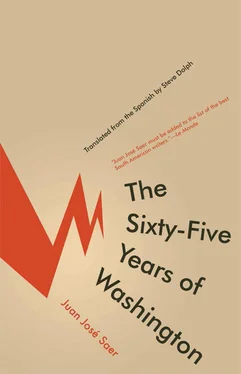Juan José Saer - The Sixty-Five Years of Washington
Здесь есть возможность читать онлайн «Juan José Saer - The Sixty-Five Years of Washington» весь текст электронной книги совершенно бесплатно (целиком полную версию без сокращений). В некоторых случаях можно слушать аудио, скачать через торрент в формате fb2 и присутствует краткое содержание. Год выпуска: 2010, Издательство: Open Letter, Жанр: Современная проза, на английском языке. Описание произведения, (предисловие) а так же отзывы посетителей доступны на портале библиотеки ЛибКат.
- Название:The Sixty-Five Years of Washington
- Автор:
- Издательство:Open Letter
- Жанр:
- Год:2010
- ISBN:нет данных
- Рейтинг книги:3 / 5. Голосов: 1
-
Избранное:Добавить в избранное
- Отзывы:
-
Ваша оценка:
- 60
- 1
- 2
- 3
- 4
- 5
The Sixty-Five Years of Washington: краткое содержание, описание и аннотация
Предлагаем к чтению аннотацию, описание, краткое содержание или предисловие (зависит от того, что написал сам автор книги «The Sixty-Five Years of Washington»). Если вы не нашли необходимую информацию о книге — напишите в комментариях, мы постараемся отыскать её.
The Sixty-Five Years of Washington — читать онлайн бесплатно полную книгу (весь текст) целиком
Ниже представлен текст книги, разбитый по страницам. Система сохранения места последней прочитанной страницы, позволяет с удобством читать онлайн бесплатно книгу «The Sixty-Five Years of Washington», без необходимости каждый раз заново искать на чём Вы остановились. Поставьте закладку, и сможете в любой момент перейти на страницу, на которой закончили чтение.
Интервал:
Закладка:
And so on. According to Botón — according to the Mathematician, no? — Héctor, hearing the response from Beatriz, hesitated a moment (though it continues to be always the same), panicking briefly, possibly thinking, and with some reason this time, that the vast conspiracy, implicating even his most precious possessions, so to speak, even Paolo Ucello and the cosmos, was just then reaching a decisive juncture, and if he hoped to dismantle the organization that had finished off his master Malevich and whose cloaked schemes had succeeded in keeping several women from falling in love with him and sometimes wore holes in the elbows of his Pierre Cardin sweaters, he needed to put all his faculties to use, including his intelligence which, and why not admit it, says the Mathematician, is of superior quality , capable of swimming effortlessly in the waters of the trivium as well as the quadrivium . The best thing would be to demonstrate that in spite of the conspiracy he had understood everything, and since the active members of the organization refused to confess, he would explain things to them step by step and in complete detail. Like so: Noca had nothing to do with it. You had to consider the assertion and forget about the subject. If Washington had brought up the mosquitos it was because he wanted to improve the proposition included in Noca’s assertion, and the fact of bringing up the mosquitos seemed to grant Noca some credibility, assuming he had correctly interpreted the evidence gathered from this or that person, although, frankly, the present company wasn’t at its most loquacious. One of the mosquitos never approached Washington, another approached repeatedly and when Washington tried to swat it, it took off and flew away, and the third one had let itself get swatted immediately. That was it, right? He wasn’t mistaken? In his opinion, given that Washington had made the comparison, to Washington the mosquito that lets itself get swatted is in the same situation as the riderless horse that stumbles. Washington was the one who suggested this. All he was doing was clarifying what Washington had said. He wasn’t for or against either Washington’s assertion or Washington himself. If there were objections they should be directed to Washington. And if he had stated things poorly he hoped Washington would offer some corresponding clarification.
According to Botón, Washington rearranged the blanket, which was already sitting well on his shoulders, and directing himself to Héctor’s somewhat anxious expectation, which stood out among the general expectation, shook his head, saying, no, Héctor hadn’t stated things poorly, but rather just the opposite, almost perfectly, that no one, least of all him, Washington, could have done better, and for that reason, naturally, not the slightest clarification was necessary. Some might consider the horse/mosquito identification excessive, somewhat abbreviated maybe, and he ran the risk of the yellow press publishing essays to that effect, but he, Washington, wasn’t going to split hairs, realizing that, out of necessity to the exposition, and given the lack of useful information in such a thorny subject, simplifications were inevitable, and it was up to the insightful listener to introduce the necessary qualifications.
— I understand, I do, Leto says. But watch the guardrail.
The Mathematician, wrapped up in the Héctor-Washington controversy, does not seem to realize that they have reached the bright corner, and that two steps from now they will reach the edge of the sidewalk, so wrapped up in fact, even now, and twice over, so to speak, that Leto, who has assumed a protective attitude toward the Mathematician after the incident with the pants, is afraid that in his abstracted walk with his gaze fixed on the future, that is, on the end of the street, the Mathematician will fail to perceive the drop-off of several centimeters between the sidewalk and the street and will fall to the ground. He fears this for several reasons, among which the Mathematician’s so-called physical integrity enjoys a significant place — if the expression fits — but not, though not far behind, the primary, belonging to his apprehension that an error in translation, just a common motional accident, a false step, might completely demolish the harmonious im age of the Mathematician which, after forty-five minutes of walking, give or take, he has begun to appreciate, and whose recent fissures, occasioned by the incident with the pants, are at the point of healing. An accident after such an event could dramatically transform a situation which, in general, falls into the category of comedy — comedy, no? — which is, if you think about it, just a delaying of the inevitable, a merciful silence toward the brutal progression of the neutral and its nauseating confusion, the passing, gentle delusion of celebrating the error rather than wasting one’s voice and impotent fury cursing it.
Leto’s fear also has an external justification: the corner is practically deserted and they have now left behind what is referred to — certainly out of convenience — as the city center, where the somewhat more crowded cluster of shops, vehicles, unlit billboards, and people produced a particular turmoil which they crossed with certain indifference, owing to the internal effort required by their verbal exchanges and the subversion of moral energy, you might say, that it cost them to oppose Tomatis’s insistent and blind maledictions. And because, paradoxical as it may seem, the decrease in danger in a certain sense increases the risks as their vigilance relaxes — or so it seems to Leto, in any case — he has the impression that the Mathematician, impassioned again after the bad moments they went through a couple of blocks ago, having forgotten them, is now more vulnerable. But he is wrong: in full control of his so-called physical and intellectual faculties, the Mathematician adapts to the transition across the cable and crosses over without losing the thread of the story — so to speak — which, because of his unnecessary circumspection, Leto himself forgets. Leto’s distraction has other causes: as they cross the street, now that most of the shops have disappeared, you could say, they give way once again, if you like, to the suites, waiting rooms, and offices of various professionals, the old, single-story houses with ornate façades and iron balconies that evoke the persistent comparison with a mausoleum whose tombstones would one day be decorated with the bronze plaques announcing the name of the owner and the nature of his trade. At the same time, that accumulation of professions, by class, whose so-called economic and social logic he is not ignorant of, makes him conceive of the city not as though it were divided into neighborhoods or sections, but rather into territories in the animal sense, an archaic and violent demarcation of ritual, bloody defense. And he is so absorbed in this depressive sensation that, without realizing that they have reached the opposite sidewalk, he is the one who trips over the guardrail. And to think I worried for him because of the excessive love he has for his pants , he thinks with a certain childishness, while everything spins around inside his head as he stumbles onto the sidewalk. And as he thinks this, practically falling, a pleasant and unexpected sensation surprises him: the Mathematician’s strong arms, which have made his tackles feared and admired in every university campus along the coast, and including in Buenos Aires, in Córdoba, in La Plata, and even in Montevideo, prevent his fall and support him fraternally thanks to his quick, precise reflexes and the unique opportunity that destiny presents him to demonstrate to the world, and above all himself, that he is capable of an awareness of external objects and phenomena besides his pants. For a few seconds Leto finds himself tilting forward, his feet barely touching the ground, wrapped in the Mathematician’s thick arms, feeling the contact of the white, immaculate shirt against his cheek, his half-displaced glasses pressed against his ear by the Mathematician’s chest to keep them from falling, the cigarettes and matches, which he carried in his shirt pocket, scattered on the sidewalk because of the violence of the jolt that projected them forward.
Читать дальшеИнтервал:
Закладка:
Похожие книги на «The Sixty-Five Years of Washington»
Представляем Вашему вниманию похожие книги на «The Sixty-Five Years of Washington» списком для выбора. Мы отобрали схожую по названию и смыслу литературу в надежде предоставить читателям больше вариантов отыскать новые, интересные, ещё непрочитанные произведения.
Обсуждение, отзывы о книге «The Sixty-Five Years of Washington» и просто собственные мнения читателей. Оставьте ваши комментарии, напишите, что Вы думаете о произведении, его смысле или главных героях. Укажите что конкретно понравилось, а что нет, и почему Вы так считаете.












